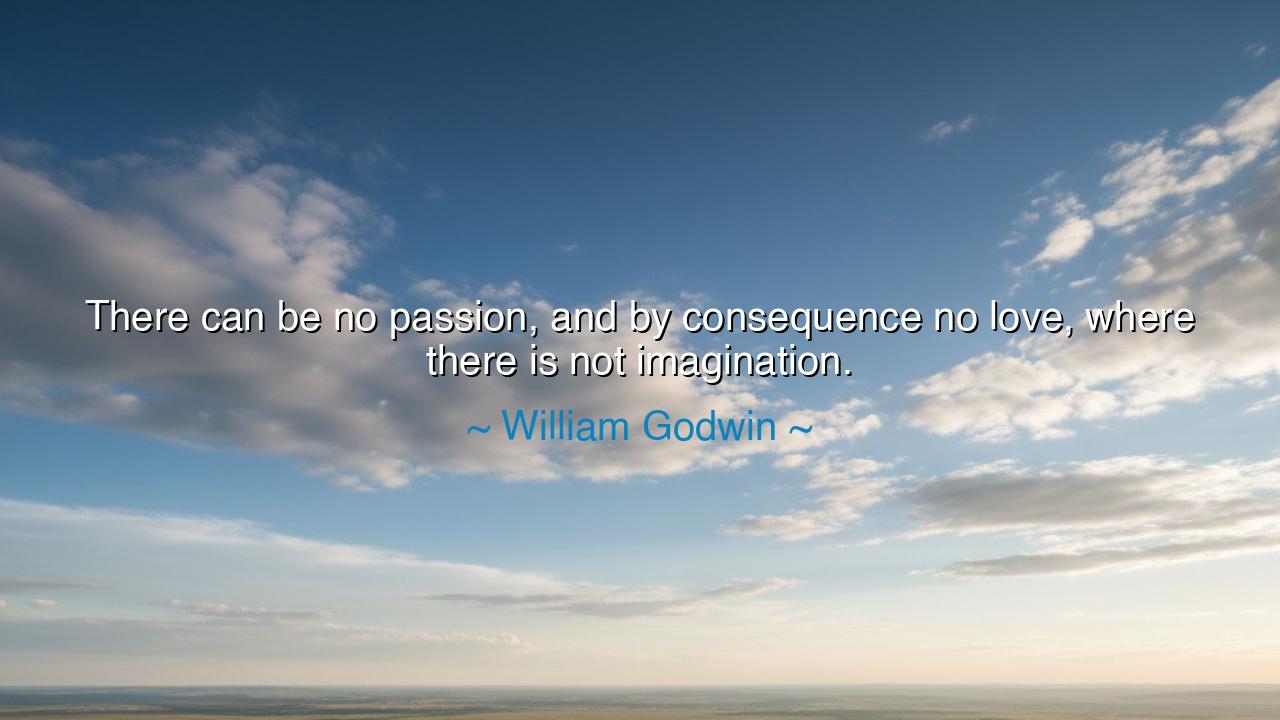
There can be no passion, and by consequence no love, where there






“There can be no passion, and by consequence no love, where there is not imagination.” Thus declared William Godwin, philosopher, reformer, and father of Mary Shelley, whose own creation — Frankenstein — stands as one of the greatest testaments to the power of imagination ever penned. In this simple but profound truth, Godwin speaks of the divine bond between imagination and love, between the mind that envisions and the heart that feels. He teaches that passion, in all its beauty and fire, does not arise from reason or flesh alone — it is born of the imagination, that sacred faculty which allows us to see not only what is, but what might be. Without it, affection grows mechanical, and love becomes a shadow without a flame.
To imagine is to endow the world with life beyond the visible. When we love, we do not love the body alone, nor even the deeds of another, but the vision of who they are and who they could become. Thus, imagination is the mother of passion — it paints the beloved in hues of meaning, depth, and wonder. The heart alone may desire, but it is the imagination that elevates desire into devotion. Without it, affection would remain shallow, incapable of wonder or faith. The one who cannot imagine cannot truly love, for they cannot see beyond the moment, cannot create within their heart the infinite worlds that love demands.
In his age, William Godwin was known as a thinker who believed in the perfectibility of humankind, a man who held that reason and virtue could elevate the soul. Yet in this quote, he acknowledges what reason alone cannot provide: the necessity of imagination in giving depth to life’s greatest emotions. He understood that while logic builds the mind, imagination builds the heart. Passion and love, in his view, are not mere reactions of the senses but acts of creation — the soul’s poetry made flesh. To love, then, is to become an artist of the spirit, shaping from the clay of another’s being a vision of wholeness and beauty that transcends imperfection.
History itself gives proof of Godwin’s wisdom. Consider the story of Abelard and Héloïse, lovers of the twelfth century whose bond endured beyond scandal, separation, and suffering. Their letters — filled with longing, thought, and vision — reveal how imagination transforms pain into poetry and desire into eternity. Though forbidden to meet, they lived entire worlds through words alone. Their love, deprived of physical presence, survived through imagination, which allowed them to dream each other into being, even from afar. Thus, imagination is the bridge that love builds when life tears down every other.
The ancients, too, saw this truth written in the stars. Plato, in his dialogues, spoke of love (eros) as the ladder by which the soul ascends to the divine — an act not of possession, but of vision. The lover, he said, sees in the beloved a reflection of eternal beauty. This seeing — this sacred perception — is none other than imagination. For love is not content with what the eyes behold; it seeks what lies unseen, and it believes, with holy audacity, that the unseen can be made real. Thus, even in philosophy’s cradle, imagination was crowned the companion of love, and together they were deemed the path to immortality.
But Godwin’s truth reaches beyond romance. In every form of passion — for art, for justice, for truth — the imagination is the fire that kindles meaning. The reformer must first imagine a better world before striving to build it. The artist must imagine beauty before their hands can shape it. The lover of humankind must imagine peace before daring to fight for it. All noble action begins in vision — and all true vision begins in love. Thus, to live without imagination is to live without passion, and to live without passion is to be only half alive.
So let this be the lesson, passed down like flame from ancient lamps: guard and nurture your imagination, for in it lies the seed of your love and the strength of your passion. Do not allow cynicism to dull it, nor habit to tame it. When you love, imagine greatly — see in others not what they are, but what they might yet become. When you work, let imagination guide your purpose and passion fuel your will. For love and life are both acts of creation, and creation belongs to those who dare to dream.
And remember, as William Godwin taught, that reason may show you the world as it is, but imagination reveals the world as it could be — and it is in that vision that love finds its eternal home.






AAdministratorAdministrator
Welcome, honored guests. Please leave a comment, we will respond soon